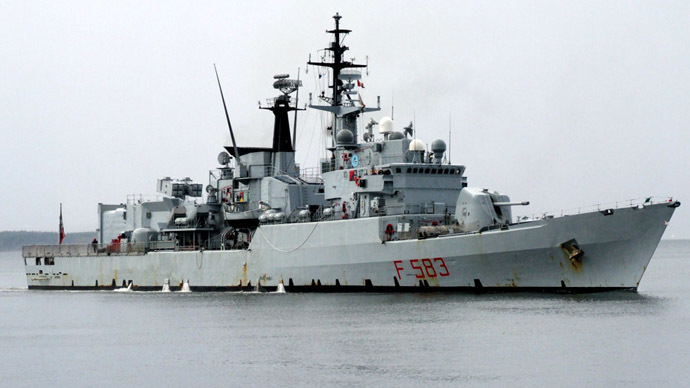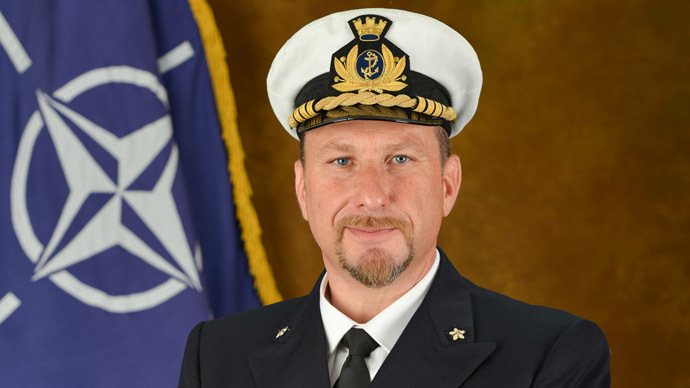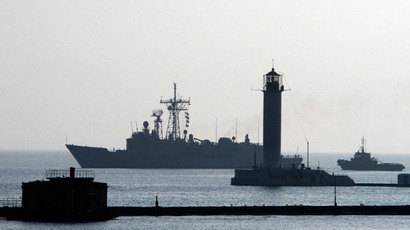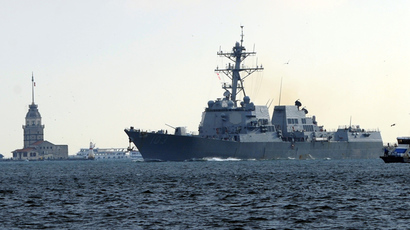NATO holds reduced Black Sea naval exercises without Ukraine

Four NATO warships are in the Black Sea for annual Sea Breeze military drills with regional navies, but this year the number of participants has fallen significantly due to the civil war in Ukraine, which hosted the exercises in previous years.
The ships form NATO’s rotational Mine Counter-Measures Group TWO (SNMCMG2) formation led by Italian Navy captain Giovanni Piegaja.
The group’s flagship is an Italian Navy frigate, the ITS Aviere, accompanied by another Italian battleship ITS Rimini, Turkish TCG Akçay and British HMS Chiddingfold.
The task force is expected to be beefed up by American and Greek warships. The US has also provided a patrol warplane.
Last year the number of participants was much greater. It included Azerbaijan, Bulgaria, Canada, Georgia, Germany, Italy, Romania, Turkey, Ukraine and the US, with France, Germany, Libya, Lithuania, Qatar, and UAE sending observers.
The group’s mission in the Black Sea consists of organizing training with Bulgarian and Romanian navies. The force is set to call at the Bulgarian port of Burgas on July 4 for the first stage of the Exercise BREEZE drill this year led by the Bulgarian Navy.
Later the force will move to Romanian waters for additional joint training.
The main objective of the exercise is to improve collaboration of the naval forces of different NATO member states. Bulgarian Naval Forces’ staff will be certified for independent operations planning conformity, according to NATO criteria.
“During SNMCMG2’s deployment in the Black Sea, we look forward to working with international partners in Exercise BREEZE to improve our operational and tactical capacity and interoperability in a multi-threat environment,” NATO’s website cited Capt. Piegaja as saying.
“Our deployment is a clear demonstration of our commitment to the Alliance’s strong solidarity and collective defense,” he said.

Italy assumed the command of the SNMCMG2 group on June 19 in Catania, Sicily. Since then the group has patrolled the Mediterranean Sea and conducted mine counter-measures and force integration training, as part of NATO’s counter-terrorism Operation ACTIVE ENDEAVOUR, NATO’s website says.
The Sea Breeze naval drills in the Black Sea have been conducted annually since 1997 with Ukraine hosting the exercise in the Crimea peninsula and waters around it.
Due to the Republic of Crimea reuniting with Russia earlier this year, Ukraine has relinquished the right to host the exercise, which was redeployed to the western sector of the Black Sea.
The bloody turbulent developments in Ukraine, where troops and private armies are trying to force into submission the eastern regions demanding federalization of the country, have put the whole region on alert. Both NATO and Russia have conducted a number of military drills close to Ukrainian borders.
The extensive naval activity by NATO in the Black Sea against the background of the Ukrainian crisis shows an unfriendly attitude toward Russia and remains a “direct threat” to Russia’s national security, Igor Korotchenko, editor-in-chief of National Defense Magazine, told RIA Novosti news agency.
“NATO’s electronic reconnaissance vessels are effectively present in the Black Sea on a permanent basis,” Korotchenko said, adding that the visits of Aegis-enabled US missile cruisers in the region next to the Crimea Peninsula were another serious challenge to Russia.
Korotchenko expressed confidence that Russia’s Black Sea fleet was closely following all movements of NATO naval forces in the region, and was ready to respond promptly and effectively to any threatening situation.
“Crimea was, is and will remain an indispensable part of Russia and no military blackmail or threats could change the principal position Russia has taken over the issue,” Korotchenko said. He also called for the urgent modernization of the Black Sea fleet and coastal military infrastructure.
Russia always opposed the Sea Breeze drills conducted in the imminent vicinity to its major Black Sea naval base in Sevastopol. Because of historic reunification of the Crimea Peninsula, where the city of Sevastopol is situated, with Russia in March this year, the harbor of Sevastopol has been permanently closed to NATO ships.














